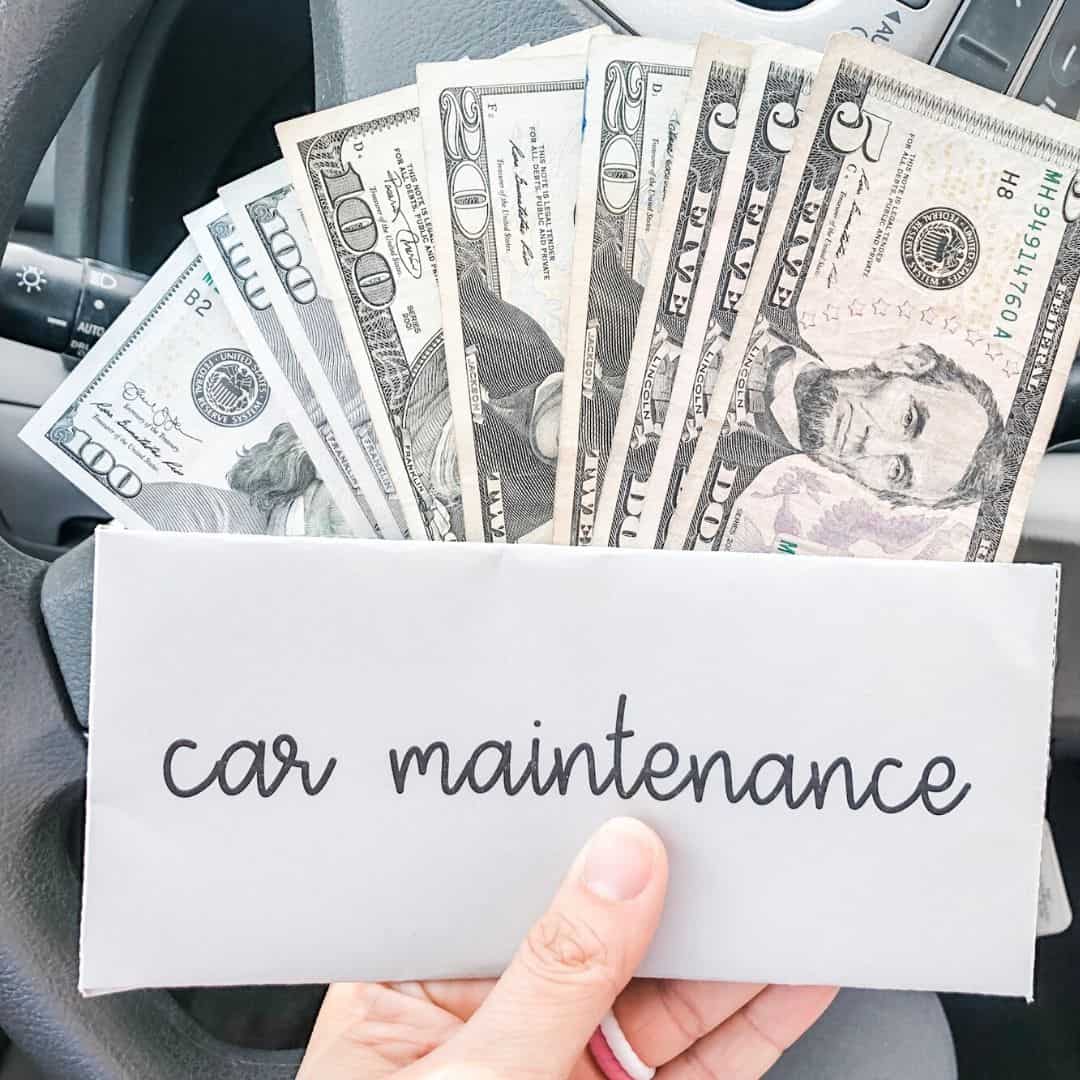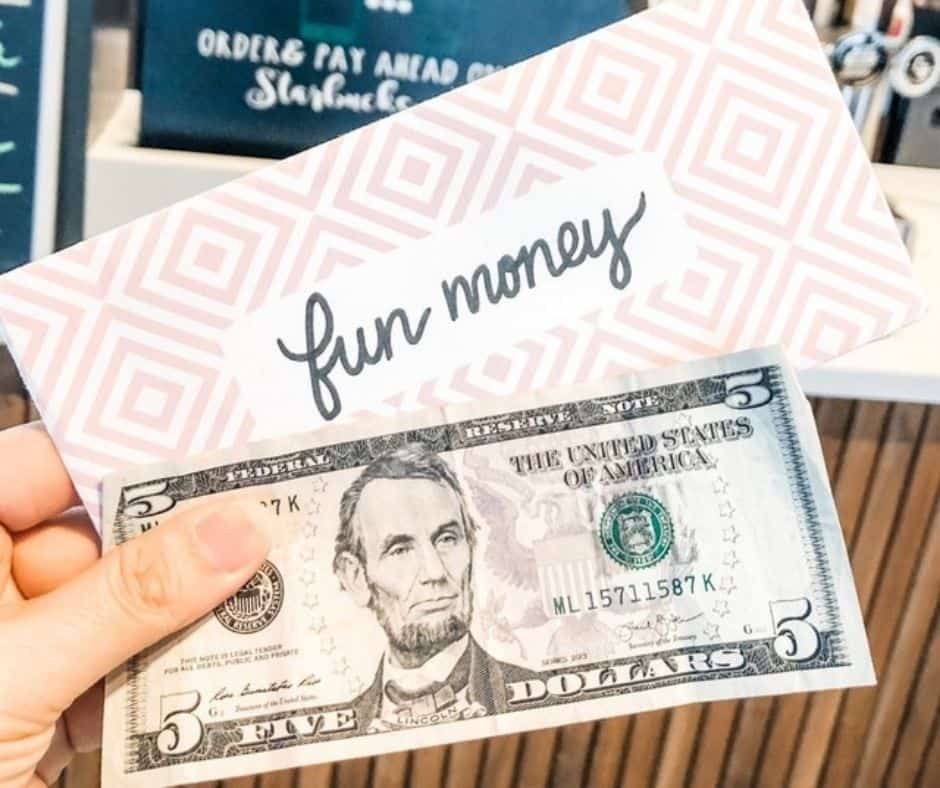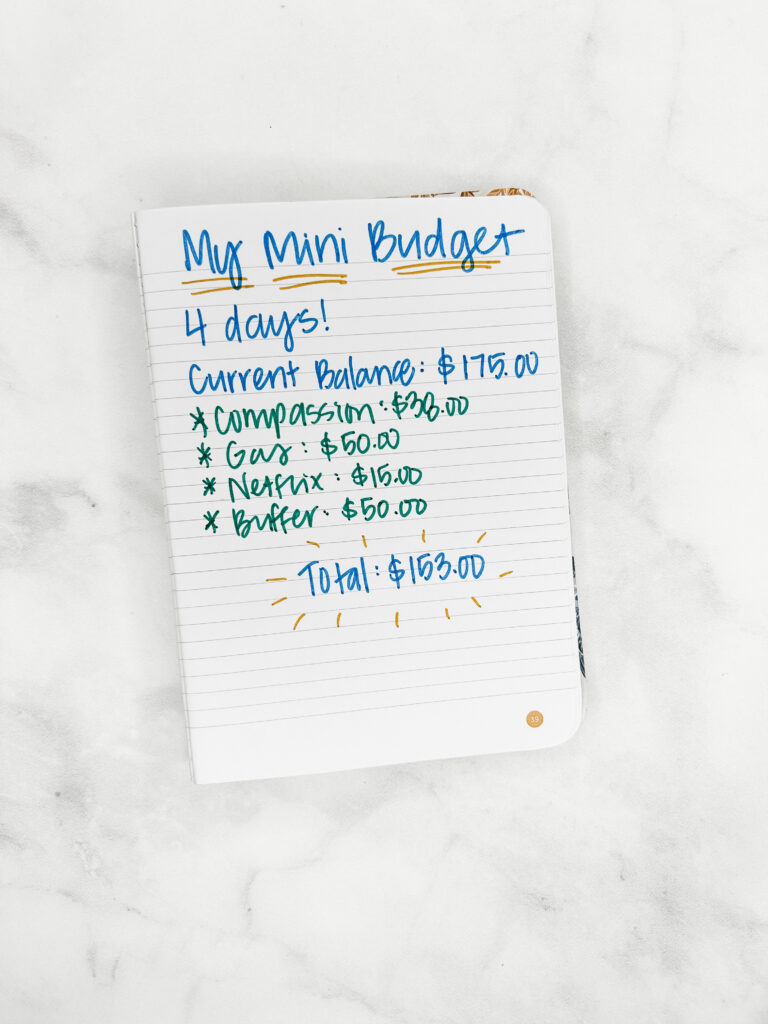It’s easy to write a budget that you think is perfect until you’re 5 days in and you realize you forgot to add in room for an upcoming birthday or a seasonal activity with your family. When these forgotten budget items are missing from your budget, suddenly budgeting feels impossible.
If you feel like giving up and throwing in the towel, you are not alone. We’ve been there. One of the biggest reasons you’re blowing your budget is because you aren’t creating a realistic budget.
When a budget isn’t realistic, it is usually because you’re not budgeting enough money for a budget category or you’re leaving a category out of your budget altogether. This free cheat sheet will help you kickstart your budget and pay off debt fast.
In 2024, set yourself up for success and budget and make sure these 15 missing budget items are in your monthly budget.
15 Common Missing Budget Items
1. Gifts
It can be easy to overlook gift-giving when you sit down to write your monthly budget. So often I would sit down, write out what I thought was a flawless budget, and then realize I had forgotten about a gift I needed for an upcoming event.
Keep track of these dates and reference them when you sit down to build your budget:
- Birthday Gifts
- Anniversary Gifts
- Graduation Gifts
- Christmas Gifts
- End of the Year Teacher Gifts
- Valentine’s Day Gifts
- Mother’s Day Gifts
- Father’s Day Gifts
Even better, set up a gift-giving sinking fund! This allows you to save money (even $20 each month goes a long way) and cover the cost of gifts when they come up.
2. Car Maintenance
I hate to be the bearer of bad news, but here it is … cars break. They are not built to last forever.
They require oil changes, tire replacements, registration costs, etc. If you put a set amount of money each month into a car maintenance sinking fund, then you can offset (or completely cover) these costs when they arrive.
Our family currently sets aside $50 each month to pay for upcoming car expenses. While the amount we’ve saved up might not cover the entire repair cost, it does help take the edge off the cost.
To stay ahead of surprise car bills, it’s always a good thing to ask your trusted mechanic about any upcoming maintenance your car needs along with a price estimate.
This will help alleviate the surprise of upcoming maintenance bills.

3. Entertainment Money
Just because you want to save more and spend less doesn’t mean that you have to skip out on entertainment entirely. So many people think that when you are on a budget that you can’t have any fun.
Truthfully, you can have a lot of fun but you have to plan it out. Consider setting aside some money each month to do something fun with your family and friends.
4. Medical Bills
Are you overlooking any upcoming doctor’s or dentist’s appointments? Copays and deductibles can get expensive and can be a strain on a budget if you are unprepared.
Before you sit down to make your budget, check your calendar for any scheduled appointments.
Don’t hesitate to call the doctor’s office in advance to determine the amount that you will be charged. Preparation leads to success!
5. Clothes
Clothes don’t last forever. Seasons change and children will need new clothes for school.
Just because you are living on a budget doesn’t mean that you can’t have new clothes. Anticipate the need and plan for the cost.
When it comes to buying a lot of clothes at once (like back-to-school clothes) think about budgeting the cost over several months to help spread out the large expense. You can even set up a sinking fund to help you cover most (if not all) of the costs of the new clothes.
6. Memberships
Don’t get caught off guard by yearly memberships or subscriptions. Many times these memberships are on autopay and you don’t even realize they are due until the money has already been taken out of your account! (I’m speaking from experience here!)
I recommend that you keep a list of your annual memberships with their renewal date in your budget binder so you can reference them often.
Common memberships & subscriptions to check:
- Wholesale Club (like Costco, Sam’s Club, or BJ’s Wholesale Club)
- Amazon Prime
- Monthly Subscription Boxes
- Gym Membership
- Streaming Services
- Insurance Premiums
7. Home Maintenance
Having a home can be expensive, but these expenses don’t have to catch you off guard. Home maintenance costs are a common item missing from many people’s budget.
Not only is there always a possibility of big items breaking, but there is also a lot of maintenance that comes with purchasing a home.
From replacing filters to keeping the yard outside mowed and trimmed, the costs can pile up. Don’t forget to budget each month for necessary fixes. Including home maintenance costs in your budget will help you keep your home and budget in line.
8. Holiday Extras
During my first year of getting my finances back on track, I always failed to plan for the “extras” around each holiday.
Christmas cards and pictures with St. Nick add up. And I don’t know if you bought candy last year for Halloween, but those bags are not cheap!
Valentine’s flowers cost money too and the Easter bunny doesn’t bring eggs for free.
Don’t overlook these extra expenses! To make budgeting for these extra expenses easy, sit down and think through everything you’ll do for next holiday. In your mind, walk through what you’ll be doing, eating, and visiting. This will help you catch any budget items you might be missing.
9. Haircuts
For years he has refused, saying that I would butcher his hair. Well, when my son was old enough to justify a haircut by a professional, I did what any frugal momma would do.
True story: I have begged my husband for years (years!) to let me cut his hair. I told him that it could save us $30 a month and that OF COURSE, I could cut his hair just as good as the lady at Sportclips.
I equipped myself with a pair of scissors, clippers, and a how-to video on youtube. Within minutes my son was bald on one side and on his way to a professional who could fix mommy’s mistake.
Needless to say, our monthly budget includes professional haircuts for every person in our family.
10. Guests
Are you forgetting to factor in the cost of hosting overnight guests? You will likely buy extra food for breakfast and snacks as well as use extra electricity and water.
It all adds up and should be accounted for. Plan for an increase in your grocery budget this month and an increase in your utility bills next month.
11. Personal Spending Money
One of the best hacks to stay on budget is to remember to add personal money to your budget. A lot of people feel like they shouldn’t budget for personal money (especially if they’re in a lot of debt), but everyone needs to have this category in their budget.
When you budget for personal money, you don’t feel like you’re being deprived of spending money on yourself. Personal spending money allows you to spend on whatever you want, no questions asked.
It’s important to remember that deprivation leads to burnout. Spending money helps you live on a budget and not deprive yourself of what you want at the same time.
A lot of people always ask me how much to budget for this category.
That depends on your personal choice, your income, and your money goals. If you’re trying to pay off your debt fast, you may want to have a smaller amount for this category.
I personally budget $25/month per person. You can budget $20 – $50 (or more) depending on what you want, your income, and your money goals.

12. Kid’s Expenses
Kid’s expenses can add up quickly. You can easily get nickeled and dimed with your kid’s expenses.
Common expenses for kids:
- Field Trips
- School Lunches & Snacks
- Misc School Fees (T-shirts, Yearbooks, Fundraisers, Book Fairs, etc)
- Summer Camps
- Sports Fees
Check your kid’s school and extracurricular calendars before you write your budget for your next pay period.
13. Vacation Fund
If you plan on taking a vacation, you need to add it to your budget. This is another common sinking fund category. Even if you’re traveling on a budget or having a staycation, you can add it to your budget.
Just figure out what you want your budget to be and divide by the number of months until your vacation. That’s how much you need to save in your sinking fund.

14. Pet Expenses
If you have an older pet or one with medical needs, you need a pet fund. Vet bills can get expensive quickly (especially if you don’t have pet insurance)
You don’t want to be caught off guard not being able to pay for your pet’s medicine or surgery.
15. A Buffer In Your Budget
One of the MOST common expenses or items missing from a budget is also the most important…a buffer. Your buffer category will help absorb the cost of smaller unexpected expenses that come up.
Ultimately, it helps you from dipping into your savings or worrying about over drafting from your checking account.
A buffer can be sued to cover small unexpected expenses like a field trip your child forgot to tell you about until the last minute. It can also cover the cost of variable bills that you didn’t know would be higher. For instance, if your electricity bill is $125.00 but you only budgeted $105.00…your buffer can cover this cost!
The buffer category is usually about $100 per month or pay period. Choose a buffer amount that you are comfortable with and add it to your budget.

Reasons You Need To Trim Your Budget
Nearly 63% of Americans live paycheck to paycheck. When you live paycheck to paycheck, life can suddenly become really stressful. It feels like your money is running you instead of the other way around.
There are a many reasons you might need to trim your budget. Below are just a few of them.
1. You want to save more money
Saving more money is so important. When you save money it allows you to build wealth, have an emergency fund, and more.
Saving money helps protect you. You never know when you might have an unexpected event like your child having surgery or your transmission going out in your car.
When you have the safety net of an emergency fund, it prevents you from going into debt to pay for unplanned expenses that come up.
2. You want to pay off debt faster
You may want to trim your budget so you can contribute more money towards debt payments. If you’re just paying the minimum debt payments, it can seem like you’re spinning your wheels like you’re never gonna become debt free.
When you find small ways to cut back your budget to free up more cash, you can put the extra towards your debt. It may not seem like a lot when you free up money, but every little bit adds up!
If one of your goals is to pay off debt fast, then you’re going to love my Free Budgeting & Debt Payoff Cheat Sheet. In this cheat sheet you’ll learn how to find more money in your budget each month as well as the fastest way to pay off debt. Get your copy here.
3. You want to spend less in one area of your budget
You might want to just spend less in a certain budget category. Maybe you spend $800 a month on food for 3 people and you want to spend $600.
Or maybe you spend too much on restaurants.
Whatever the reason, you might want to just spend less and trim back a certain category.
4. You want to find contentment
We live in a culture of instant gratification. Everyone wants everything right now. This can breed discontentment. You’re constantly looking for the shiny new object and how to get it right now.
When you focus more on what you have and loving and accepting your current life, you practice gratitude and contentment. This in turn puts you in a better mood and makes you happier.
5. You want to keep more of your money
You work hard for your money and maybe you just want to keep more of it in your checking account and stop living paycheck to paycheck.
Like the statistic from earlier, 63% of Americans live paycheck to paycheck. It is so disheartening to work all day long to earn money and then have nothing to show for it.
Trimming your budget to give you more wiggle room for the things you want to spend money on…like that vacation you’re always dreaming about.
6. You need to increase your savings
If the past few years have taught us anything, it’s that setting aside money is imperative to financial success. By trimming your budget, you’ll have extra money to add to your emergency fund.
Budget Trimming Benefits
You might be thinking…why would I want to cut things OUT of my budget! Won’t my life be boring and less fun if I do this?
While that’s how many people think, cutting back in areas of your budget (and simply living on a budget in general) have many benefits!
Below are 3 benefits you’ll enjoy:
1. You become more content in life
When you trim your budget and live on less, you can start to find more contentment in your life. The more content you are, the less you’ll want for what you don’t have.
When you’re not content and you’re focusing on what’s not going right, it can be easy to have a scarcity mindset with money.
When you’re in a scarcity mindset, it makes you feel like your money isn’t enough and you might even become anxious or fearful when you think about your money. Cutting back on expenses frees you up to find contentment in what you have.
2. You learn to be more disciplined
Trimming your budget helps you learn how to be more disciplined with your money. You learn how to cook at home instead of hitting up the drive-thru 4 times a week.
Discipline is delayed gratification and helps you not live in the spur of the moment like impulse spending or overspending.
3. You meet your money goals faster
When you trim your budget, it frees up money so that you can use it to reach your money goals.
Maybe you want to fully fund your IRA or your emergency fund. Or maybe you want to get out of debt by the end of the year. No matter your goal, you can get there faster when you’re willing to cut back on your expenses or increase your income!
The Bottom Line
It’s important to account for every expense to create a realistic budget. Make sure these 15 common forgotten budget items are in your budget so that you can meet your money goals.
Also, don’t forget to check in on your budget and where your money is going so that you can live a more content life.


